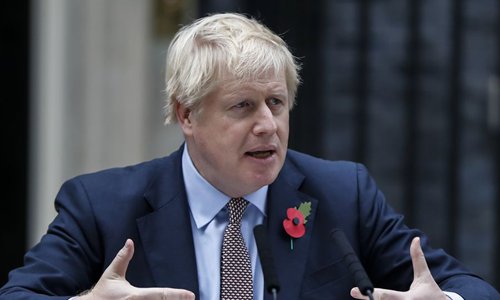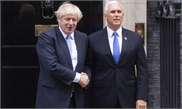British Prime Minister

has revealed that every Conservative Party candidate standing in the country's general election on Dec. 12 has personally pledged to back his Brexit deal.
In his first major newspaper interview of the election campaign, Johnson told the Sunday Telegraph that he has asked all 635 of his candidates to sign up to a pledge to back his Brexit Withdrawal Agreement in the House of Commons.
"If we get a majority Conservative government, we can deliver and there will be no more wrangling or dither or delay," Johnson said.
He said he plans to end Britain's membership of the European Union (EU) in January if he wins a majority that keeps him at 10 Downing Street.
"Of course there will be many who voted Remain, many who voted Leave, people with different views, and they will come together to get it done, and come together in the interests of the whole country."
The Telegraph commented that highly unusual decision by Johnson is designed to help convince voters who support Britain leaving the EU that the Conservatives will deliver Brexit if they return to government.
Meanwhile the newspaper reported the latest opinion poll, carried out by Savanta ComRes, puts the Conservatives on 41 percent, the highest level in one of the poll company's surveys since the last general election. Labour remains eight points behind, but has risen to 33 percent, its highest level since April.
The latest poll from YouGov puts Johnson's party even further ahead, on 45 percentage points, 17 ahead of Labour.
Both major parties came in for criticism Sunday from Carolyn Fairbairn, director general of the Confederation of British Industry (CBI).
Speaking on Sky News, Fairbairn said there were real concerns for British businesses from election pledges of both the Conservative and Labour parties.
Fairbairn cited Labour Party plans to nationalize key sectors, while the Conservative Party's immigration plans would create a skills shortage.
Fairbairn said she had real concerns that Labour proposals would crack the foundations of British economy, urging the party to work with business. She also said restrictive immigration proposals by the Conservative Party are a worry, adding that Britain needs workers of all skill levels, not just the "brightest and best."
On Tuesday, Johnson will go head-to-head with Jeremy Corbyn, leader of the main opposition Labour Party, in the first televised debate of the election campaign.

British Prime Minister Boris Johnson makes a statement outside 10 Downing Street in London, Britain on Nov. 6, 2019.(Xinhua/Han Yan)
has revealed that every Conservative Party candidate standing in the country's general election on Dec. 12 has personally pledged to back his Brexit deal.
In his first major newspaper interview of the election campaign, Johnson told the Sunday Telegraph that he has asked all 635 of his candidates to sign up to a pledge to back his Brexit Withdrawal Agreement in the House of Commons.
"If we get a majority Conservative government, we can deliver and there will be no more wrangling or dither or delay," Johnson said.
He said he plans to end Britain's membership of the European Union (EU) in January if he wins a majority that keeps him at 10 Downing Street.
"Of course there will be many who voted Remain, many who voted Leave, people with different views, and they will come together to get it done, and come together in the interests of the whole country."
The Telegraph commented that highly unusual decision by Johnson is designed to help convince voters who support Britain leaving the EU that the Conservatives will deliver Brexit if they return to government.
Meanwhile the newspaper reported the latest opinion poll, carried out by Savanta ComRes, puts the Conservatives on 41 percent, the highest level in one of the poll company's surveys since the last general election. Labour remains eight points behind, but has risen to 33 percent, its highest level since April.
The latest poll from YouGov puts Johnson's party even further ahead, on 45 percentage points, 17 ahead of Labour.
Both major parties came in for criticism Sunday from Carolyn Fairbairn, director general of the Confederation of British Industry (CBI).
Speaking on Sky News, Fairbairn said there were real concerns for British businesses from election pledges of both the Conservative and Labour parties.
Fairbairn cited Labour Party plans to nationalize key sectors, while the Conservative Party's immigration plans would create a skills shortage.
Fairbairn said she had real concerns that Labour proposals would crack the foundations of British economy, urging the party to work with business. She also said restrictive immigration proposals by the Conservative Party are a worry, adding that Britain needs workers of all skill levels, not just the "brightest and best."
On Tuesday, Johnson will go head-to-head with Jeremy Corbyn, leader of the main opposition Labour Party, in the first televised debate of the election campaign.

